

Substantive Objectivity: Embracing a Journalistic Norm of Verification. By Matthew L.
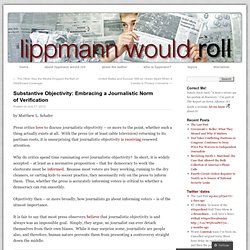
Schafer Press critics love to discuss journalistic objectivity – or more to the point, whether such a thing actually exists at all. With the press (or at least cable television) returning to its partisan roots, it is unsurprising that journalistic objectivity is receiving renewed attention. Why do critics spend time ruminating over journalistic objectivity? In short, it is widely accepted – at least as a normative proposition – that for democracy to work the electorate must be informed. Journalism and objectivity. Reality or ruse? Objectivity in Journalism is a Fallacy. By Christopher Paslay Sean Hannity recently stated on his radio program that “journalism is dead in America.”
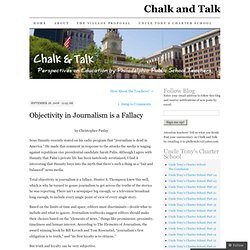
He made this comment in response to the attacks the media is waging against republican vice presidential candidate Sarah Palin. Although I agree with Hannity that Palin’s private life has been tastelessly scrutinized, I find it interesting that Hannity buys into the myth that there’s such a thing as a “fair and balanced” news media. Total objectivity in journalism is a fallacy. Hunter S. Based on the limits of time and space, editors must discriminate—decide what to include and what to ignore. Bible is standard for objectivity in journalism, Olasky says - Florida Baptist Witness. NASHVILLE, Tenn.
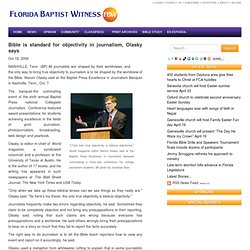
(BP)-All journalists are shaped by their worldviews, and the only way to bring true objectivity to journalism is to be shaped by the worldview of the Bible, Marvin Olasky said at the Baptist Press Excellence in Journalism Banquet in Nashville, Tenn., Oct. 7. The banquet-the culminating event of the sixth annual Baptist Press national Collegiate Journalism Conference-featured award presentations for students achieving excellence in the fields of print journalism, photojournalism, broadcasting, web design and yearbook. Objectivity in journalism faces more questions in the age of new media : Making It Better. Objectivity is one of those cardinal principles of journalism which denotes that journalists and media houses should be impartial in their reporting and coverage.
There has been a long standing debate on whether journalists and media houses are indeed or can be objective. Many media houses will insist and market themselves as the most of objective newspaper, radio or television station. The Importance of Objectivity in Journalism. And Now a Word from the Other Side: As a journalist trained in action rather than via textbooks, I learned very early to consider viewpoints other than my own when composing articles for publication.

I recently came across a headline accusing Democrats of "highjacking democracy" through election corruption. Well, you remember how the late ACORN lobbyists were "caught in the act" of registering hardly enough Mickey Mouses to change election results anywhere, least of all Disneyland. . . . However, I have it from a distinguished and esteemed Independent why and how Democrats steal elections beyond those ACORN employees who may have been paid per voter registered. When you're hungry and homeless, Mickey Mouse may help out a bit. According to Jeffrey Carter (in a 10/24/10 blog titled "Chicago Election Judge Training"), a widely published expert on finance and marketing, inter alia, we Democrats steal elections by signing up illegal immigrants and sometimes allowing them to vote twice.
Mr. Objectivity and journalism: an essay. Objectivity is the dominant ethos of modern journalism.
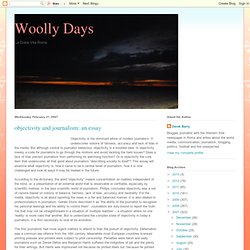
It underscores notions of fairness, accuracy and lack of bias in the media. But although central to journalist behaviour, objectivity is a troubled idea. Objectivity in Journalism: Is it Even Possible? Dave Barry once said, “We journalists make it a point to know very little about an extremely wide variety of topics; this is how we stay objective.”
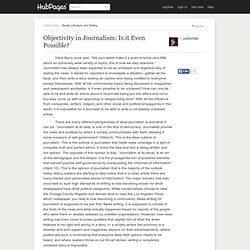
Journalism has always been expected to be an unbiased and objective way of stating the news. It allows for reporters to investigate a situation, gather all the facts, and then write a story lacking an opinion and being credited to everyone except themselves. With all the controversial topics being discussed in magazines and newspapers worldwide, is it even possible to be unbiased?
How can one be able to sit and write an article about a recent law being put into effect and not in any way come up with an approving or disapproving tone? With all the influence from companies, writers, religion, and other social and political propaganda in the world, it is impossible for a journalist to be able to write a completely unbiased article.
Objectivity is journalism’s greatest paradox. The opinions represented in this article do not necessarily represent those of the staff of CUIndependent.com nor any of its sponsors.
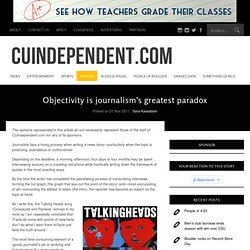
Journalists face a trying process when writing a news story—particularly when the topic is polarizing, scandalous or controversial. Depending on the deadline, a morning, afternoon, four days or four months may be spent interviewing sources on a crackling cell phone while frantically writing down the framework of quotes in the most exacting ways. By the time the writer has completed the painstaking process of transcribing interviews, forming the nut graph (the graph that lays out the point of the story) and—most excruciating of all—concocting the wittiest of ledes (the intro), the reporter has become an expert on the topic at hand. Objectivity has changed – why hasn’t journalism? The following is cross-posted from a guest post I wrote for Wannabe Hacks.
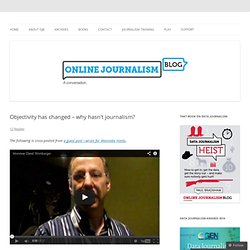
Objectivity is one of the key pillars of journalistic identity: it is one of the ways in which we identify ourselves as a profession. But for the past decade it has been subject to increasing criticism from those (and I include myself here) who suggest that sustaining the appearance of objectivity is unfeasible and unsustainable, and that transparency is a much more realistic aim.
Recently I’ve been revisiting some of the research on journalistic objectivity for my inaugural lecture at City University. But as I only mention objectivity once in that lecture, I thought it was worth fleshing out the issue further. Things change. Objectivity in Journalism. "What is 'objectivity' and how does it inform the practice of contemporary journalism? Do you think it is really possible or desirable for journalists to be objective when reporting and observing the world? " In my research about on this topic I found a succinct definition of three characteristics of objective journalism: 1.The Separation of facts and opinion 2.A balanced account of a debate 3.The Validation of journalistic statements by reference to authoritative others. (Franklin: 2005, 177) The characteristics of objectivity are easy to establish, however it is more difficult to ascertain how stringently these guidelines are followed, consciously or unconsciously.
There are many different viewpoints as to how necessary objectivity is, dating back to the start of journalism, and broadcast journalism, right up to today. James Moore: WikiLeaks and the Myth of Journalistic Objectivity. "Journalism can never be silent: that is its greatest virtue and its greatest fault.
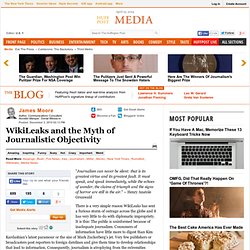
It must speak, and speak immediately, while the echoes of wonder, the claims of triumph and the signs of horror are still in the air. " ~ Henry Anatole Grunwald There is a very simple reason WikiLeaks has sent a furious storm of outrage across the globe and it has very little to do with diplomatic impropriety. It is this: The public is uninformed because of inadequate journalism. Consumers of information have little more to digest than Kim Kardashian's latest paramour or the size of Mark Zuckerberg's jet. Very few publishers or broadcasters post reporters to foreign datelines and give them time to develop relationships that lead to information.
So, long live WikiLeaks and Julian Assange. Good government, if such a thing exists, is the product of transparency. Secrecy tends to lead to disaster and there are several object lessons to study as a result of American adventures abroad. Also at: MooreThink.com. Objectivity in Journalism. Lack of objectivity in journalism threatens the very worthiness of the profession.
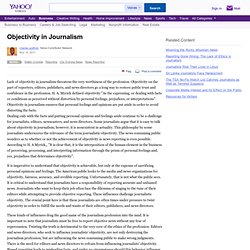
Objectivity on the part of reporters, editors, publishers, and news directors go a long way to restore public trust and confidence in the profession. H. A. Myrick defined objectivity "As the expressing, or dealing with facts or conditions as perceived without distortion by personal feelings, prejudices, or interpretations". Re-thinking Objectivity. Public Journalism and the Problem of Objectivity. Questioning Journalistic Objectivity. Journalism, as we've known it, has been mourned deeply over the last few years.
The Internet has changed everything. "Citizen journalism," a phrase that still inspires dirty looks at most journalism conferences, has blurred the lines between objectivity and subjectivity, paid and unpaid labor, news and opinion. It gives veteran journalists agita to imagine totally untrained people messing around in their exclusive, albeit hardscrabble, club. With all this reshaping and shifting of our industry, all this talk about changing financial models and publishing structures, now is an opportune time to question one of the field's most defended values: objectivity. Objectivity in Journalism. DAVID BROOKS There is some dispute about whether objectivity can really exist. How do we know the truth? Well, I’m not a relativist on the subject.
I think there is truth out there and that objectivity is like virtue; it's the thing you always fall short of, but the thing you always strive toward. And by the way, I think that opinion journalists have to be objective just as much as straight reporters. Opinion journalists, too, have to be able to see reality wholly and truly. Martha Raddatz and the faux objectivity of journalists. Numerous commentators (including me) were complimentary of the performance of Martha Raddatz as the moderator of Wednesday night's vice-presidential debate. She was assertive, asked mostly substantive questions, and covered substantial ground in 90 minutes.
That's all true enough, but the questions she asked reveal something significant about American journalism in general and especially its pretense of objectivity. For establishment journalists like Raddatz, "objectivity" is the holy grail. In their minds, it is what distinguishes "real reporters" from mere "opinionists" and, worse, partisans.
As they tell it, this objectivity means they traffic only in straight facts, unvarnished by ideology or agenda. Three things. Leave aside whether that is even a desirable mindset. These assumptions are almost always unacknowledged as such and are usually unexamined, which means that often the journalists themselves are not even consciously aware that they have embraced them.